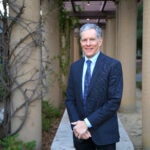Frontiers Award goes to Matthew Jackson for showing how social relations shape the economy
The BBVA Foundation Frontiers of Knowledge Award in Economics, Finance and Management has gone in this fourteenth edition to Matthew O. Jackson “for his pioneering work on illuminating the role of networks in economic and social life.” His work can be applied to the study of the labor market, inequality and even the management of crises such as the one caused by COVID-19 or Russia's invasion of Ukraine.

The jury emphasizes that Professor Jackson - Professor of Economics at Stanford University- “knew how to distinguish the importance of networks for economics over 25 years ago,” in a work that “showed how to predict which networks will form depending on the costs and benefits of forming links, and how these networks differ from the optimal ones.”
In 1996, Matthew Jackson and Asher Wolinsky published “A Strategic Model of Social and Economic Networks,” in the Journal of Economic Theory, a paper regarded today as the launch pad for all subsequent literature on the social network approach or theory in economic analysis. In it, the authors define a network as a set of agents (not only people, but also firms, institutions and markets) connected by links, and established what characteristics such networks must exhibit in order to be efficient, to the extent that their component agents are satisfied and the network remains stable.
This approach is applied now to multiple economic areas of current interest: in the analysis and monitoring of the COVID-19 pandemic, in global supply chains, in financial crises, in polarization of beliefs, and even in wars, such as the invasion of Russia in Ukraine. “Professor Jackson developed a theoretical framework for network analysis in economics, but not just as an abstract exercise, he has pushed forward the field in every possible arena, including experimental work,” says Manuel Arellano, committee secretary and Professor of Economics in the Center for Monetary and Financial Studies (CEMFI) of Banco de España.
“Networks permeate everything that an economist studies,” Jackson adds. “Yet we had no real network models until quite recently, so we worked on building the first basic models, also introducing the idea of networks and the ways they work into economic analysis.”
In the case of wars, for example, research by Professor Jackson, co-authored with Stephen Nei and published in PNAS in 2015, showed how throughout history, as economies have become “intertwined,” countries have had less incentive to declare war on each other. The paper concludes that there is a correlation between the decrease in the incidence of wars and the increase in the number of alliances countries have, positing the growth of world trade as a possible explanatory factor.
In this context, countries have “more modern instruments”, in his words, “to dissuade countries from prolonging a conflict,” like that now unfolding in Eastern Europe with Russia’s invasion of Ukraine. “At present,” he explains, “the kinds of sanctions that are being imposed on Russia and Belarus to cut off some of their financial ties and banking opportunities, and to cut off social ties where their population can move in and out of the country, those things can have a considerable impact.”
As a lever of pressure, it could not work if there were not such intense trading between countries: “Undoubtedly the fact that there is now a dense network of international trade and that Russia forms part of the global economy gives cause for hope of a solution to the conflict. If we had none of these instruments, we would have no choice but military intervention.”

Frontiers Award goes to Matthew Jackson for showing how social relations shape the economy.
“It is hard,” Professor Jackson elaborates, “to understand what is going through Russia’s leaders’ minds right not and what we can do to stop them. But without these economic instruments we would have no hope of doing so. If there is hope, it is that these tools will work and remind them that we live in a global world, and how important it is for them to keep on good terms with the rest of the world. Let’s hope that this is a lesson for all the planet’s leaders: we need other countries to be willing to cooperate with us, so we can all enjoy welfare and prosperity.”
No transacting without information sharing
“Most of our interactions as human beings are social,” explained the new laureate, “we depend on other people for information, connections, opportunities, and also for norms of behavior. So the networks we are embedded in become very important determinants of our behavior and outcomes.
Professor Jackson discovered the key role of homophily, the fact that people tend naturally to associate with others who are similar to themselves in dimensions such as age, religion, social class, ethnic group, language or economic standing, etc. “This has good and bad effects. On the one hand it is easier to learn from people who are similar to one’s self, such that I learn more from someone with my same background. So if a kid is trying to decide whether they should go to university, somebody else who is very similar to themselves can give them good advice. But at the same time, the fact that homophily divides our networks into different groups means that people in one group might not have access to information that people in another group have. So the fact that your sources of information, your opportunities, your norms of behavior are all determined by the people around you means that these splits in the network can result in very different outcomes for different people in different parts of the network.”
Closely related to this is the concept of centrality: central agents are not necessarily those with the most network contacts, but those who enjoy connections with third parties that are more likely to yield favorable outcomes.
Heavily networked labor markets
One of the first empirical studies where Jackson deployed his models was an analysis of labor markets, which stand out as being heavily networked. “Depending on the profession, between a third and 100 percent of jobs are obtained through social contacts, that is, thanks to a network. So when you want to get an interview somewhere it helps to have somebody that you know work for that company. Those kinds of contacts can be essential in being able to get your foot in the door, and eventually get that interview and land a job. This means that if I have a lot of friends who are employed, it’s easier for me to get a job, whereas if I have a lot of friends who are unemployed, it’s harder for me to get a job.”

When we put this together with homophily, what happens is that different parts of a network obtain very different outcomes in that some segments enjoy high employment rates while others are largely unemployed. “Understanding this,” Jackson stresses, “gives us a different perspective on how to address inequality in wages and access to employment.” It is critical to understand the structure of a network and how this influences people's ability to get a job.”
Financial contagion
Professor Jackson has also applied the network approach to financial relations, to establish when bank networks contribute to systemic stability and when they undermine it.
“In the case of a viral disease,” he explains, “the more contacts I have, the more chance I have of catching it, and the likelier I am to spread it.” Conversely, “in the case of a financial network, there are more forces at work than just this simple contact. So think of a bank with four partners. If one of them goes bankrupt, that could mean a major disruption in the bank’s activity because it’s a quarter of their business. But if, instead, they work with a hundred other banks, then if one of them goes bankrupt that’s just one percent of their business. So in that context, working with more banks and having a bigger, denser network can actually be enhancing in terms of stability, whereas if you are talking about simple contagions, that actually makes things worse. So financial contagions require a different kind of understanding of network contagion.”
Analyzing financial networks gives us a better understanding of how banks’ risk-taking strategies can magnify the fallout from a crisis and affect network equilibrium. And this is why, says Jackson, “it is important that we have better maps of financial networks, so we understand how a crisis in one country can impact other parts of the world, as we were able to witness in the financial crisis of the late 2000s.”
Improving the effectiveness of poverty alleviation policies
Experimental studies have taken Professor Jackson to India, where he carried out fieldwork with Abhijit Banerjee and Esther Duflo, founders and heads of the MIT Poverty Action Lab and winners of the Frontiers of Knowledge Award in Development Cooperation 2008. These studies have tried to detect how to most effectively influence economic policies by studying which people are the hubs of interpersonal networks in a community.
The research observed how banks tried to offer loan programs to poor people in rural India and, in some cases, were highly successful in some villages but in others didn’t get much take-up. They looked at the structure of social networks in these villages, and found out which people the banks had contacted and how this affected the spread of information on the loans.
“We also studied how the networks reacted to the loans,” Professor Jackson relates. “And it turned out that with people who got loans, their networks improved, and with those who missed out, their networks somewhat disintegrated. So there were changes in the networks as a result of the intervention of the loans. The networks predicted what occurred with the loans, while the loan program, in turn, had effects on the networks.”
propias redes”.